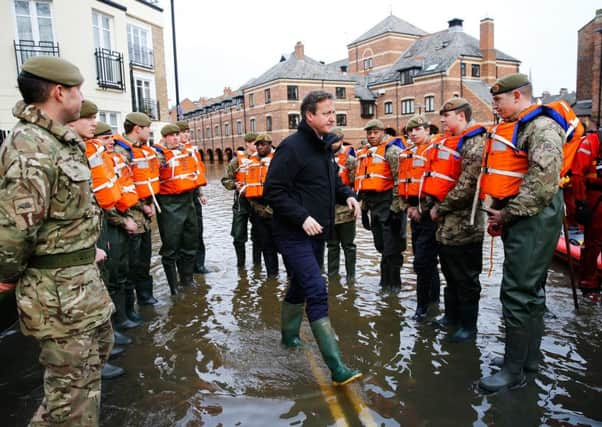YP Comment: PM and the growing tide of flooding anger


It will also not be the last, judging by the increased frequency of such extreme weather and the growing tide of public anger at the extent to which investment in this region’s flood defences have been compromised by Government austerity cuts and a widespread perception of a funding bias in favour of the South.
Even though the PM rebutted this assertion when he visited York to meet rescuers, he must accept the reasons why marooned residents feel betrayed. Having told the flood-hit residents of Todmorden, and other towns, that “the Government stands by to help in any way we can”, Calderdale Council was among many to be left high and dry when it came to clean-up costs. It was gesture politics of the very worst. Contrast this with Mr Cameron’s “money no object” promise two winters ago when the Thames submerged the Home Counties, including his own constituency.
Advertisement
Hide AdAdvertisement
Hide AdThe disparities do not end here. Even though the Government dug deep and found £297m last December to pay for new flood defences for the Thames Valley, it turned a deaf ear to pleas from MPs in February 2011 for Ministers to press ahead with a £180m scheme in Leeds which would have covered a 12-mile stretch of the river Aire and protected 4,500 city centre properties.
After main roads became impassable mud-strewn swamps and parts of the county’s creaking rail network vanished under the water, it gives rise to the suggestion that this county’s taxpayers are second class citizens and it was impossible not to sympathise with Judith Blake, the leader of Leeds Council, when she suggested that this would not have been tolerated in the prosperous Home Counties. This clearly irked the Tory leader when he said the Government was increasing spending “up and down the country”. Yet the reality is that many of these schemes are undertaken in partnership with councils and agencies whose budgets have already endured disproportionate cuts.
Will the Prime Minister’s promised review address this? On past form, the issue will quickly be forgotten by Mr Cameron and Ministers like Liz Truss, the unconvincing Environment Secretary, once the floodwaters have subsided. Yet this complacent indifference explains why the Government is facing so many demands to protect those locations which are vulnerable to rapidly-rising rivers at a time when the Environment Agency is facing further job losses.
And then there is Mr Cameron’s review of existing flood defences, and their resilience, in the wake of the controversial decision to raise the river Foss flood barrier in York and which resulted in several hundred homes being flooded when they expected to be safe. This is only part of the solution – these problems will recur unless all new developments are flood-proofed at the outset to reduce future risks. The challenge is achieving this without slowing down an already convoluted planning system still further.
Advertisement
Hide AdAdvertisement
Hide AdUntil the Prime Minister recognises that his current approach is indefensible, and starts demonstrating that his Government is genuinely on the side of stricken Northern communities, the tide of public anger will continue rising – and the questions will become even more embarrassing for David Cameron as his reputation on this issue sinks further. If only he’d listened to Mrs Simpson when she highlighted policy deficiencies two and a half long years ago – he only has himself to blame for playing politics with people’s homes and livelihoods.
On the flooding frontline: Invaluable role of firefighters
LIKE all public services, firefighters have been compelled to move with the times and have not been immune from budget cuts, despite the militancy of the Fire Brigades Union.
However the scale of the job losses in the past five years – 7,000 jobs have been axed in this period according to the union – suggest that either the service was grossly over-staffed in the first place or public safety is now being compromised.
Yet, while the FBU must clearly be realistic, so, too, must the Government. This issue is not just about the time that it takes to respond to fires and accidents – all crews pride themselves on being part of a fire and rescue service because of their ability to respond to all types of incidents, and especially flooding.
Advertisement
Hide AdAdvertisement
Hide AdGiven Ministers accept that such occurrences will become more frequent, the amount of damage would have been even greater without the expertise of those firefighters manning the flooding frontline in Yorkshire’s hour of need.